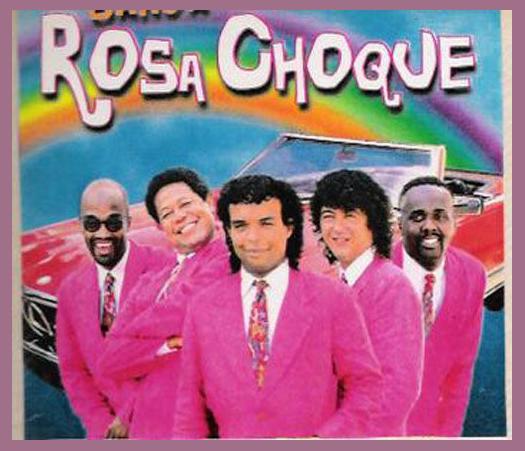 Banda Rosa Choque
Banda Rosa Choque
Banda Rosa Choque: A Journey of Controversy and Musical Triumph
Banda Rosa Choque emerged as a Brazilian music sensation in the 1990s, captivating audiences with their infectious rhythms and audacious lyrics. However, their path was not without challenges and controversy.
Formation and Early Success
The band was formed in 1990 in the city of São Paulo. It comprised a group of talented musicians, including lead vocalist Marcelinho, guitarist Gilson, bassist Álvaro, and drummer Fred. Their debut album, "Volume 1," released in 1991, propelled them to instant fame. The album featured their signature song, "Rap do Marcelinho (Tu É Gay Que Eu Sei)," a playful and provocative anthem that addressed issues of sexual orientation.
Challenges and Controversies
Banda Rosa Choque's bold lyrics and flamboyant style quickly drew criticism. The band faced accusations of homophobia and vulgarity. They were banned from radio stations and public events. Undeterred, they continued to push the boundaries, earning a reputation as musical rebels.
Despite the controversies, the band garnered a loyal following. Their live performances were legendary, filled with energy and infectious enthusiasm. They became a symbol of the Brazilian youth counterculture, representing the marginalized and challenging societal norms.
Musical Evolution and Discography
While "Rap do Marcelinho" remained their most famous track, Banda Rosa Choque continued to evolve musically. They released numerous albums, including "Volume 2" (1992), "É Assim Que Eu Gosto" (1994), and "Na Balada" (1996). Their music incorporated elements of funk, samba, and hip-hop, creating a unique and addictive sound.
Members and Departures
Over the years, Banda Rosa Choque experienced several lineup changes. Marcelinho remained the constant figure, while other members came and went. Notable departures included drummer Fred and guitarist Gilson. Despite the changes, the band's energy and creativity remained intact.
Legacy and Influence
Banda Rosa Choque's legacy extends beyond their controversial lyrics. They played a significant role in the development of Brazilian funk and helped to break down social barriers. Their music continues to resonate with fans who appreciate their authenticity, humor, and infectious rhythms.
Conclusion
Banda Rosa Choque may have faced challenges and controversies, but they emerged as a musical force that challenged the status quo and left an indelible mark on Brazilian popular culture. Their music continues to inspire and entertain, serving as a testament to the power of originality and the triumph of artistic freedom.
Banda Rosa Choque emerged as a Brazilian music sensation in the 1990s, captivating audiences with their infectious rhythms and audacious lyrics. However, their path was not without challenges and controversy.
Formation and Early Success
The band was formed in 1990 in the city of São Paulo. It comprised a group of talented musicians, including lead vocalist Marcelinho, guitarist Gilson, bassist Álvaro, and drummer Fred. Their debut album, "Volume 1," released in 1991, propelled them to instant fame. The album featured their signature song, "Rap do Marcelinho (Tu É Gay Que Eu Sei)," a playful and provocative anthem that addressed issues of sexual orientation.
Challenges and Controversies
Banda Rosa Choque's bold lyrics and flamboyant style quickly drew criticism. The band faced accusations of homophobia and vulgarity. They were banned from radio stations and public events. Undeterred, they continued to push the boundaries, earning a reputation as musical rebels.
Despite the controversies, the band garnered a loyal following. Their live performances were legendary, filled with energy and infectious enthusiasm. They became a symbol of the Brazilian youth counterculture, representing the marginalized and challenging societal norms.
Musical Evolution and Discography
While "Rap do Marcelinho" remained their most famous track, Banda Rosa Choque continued to evolve musically. They released numerous albums, including "Volume 2" (1992), "É Assim Que Eu Gosto" (1994), and "Na Balada" (1996). Their music incorporated elements of funk, samba, and hip-hop, creating a unique and addictive sound.
Members and Departures
Over the years, Banda Rosa Choque experienced several lineup changes. Marcelinho remained the constant figure, while other members came and went. Notable departures included drummer Fred and guitarist Gilson. Despite the changes, the band's energy and creativity remained intact.
Legacy and Influence
Banda Rosa Choque's legacy extends beyond their controversial lyrics. They played a significant role in the development of Brazilian funk and helped to break down social barriers. Their music continues to resonate with fans who appreciate their authenticity, humor, and infectious rhythms.
Conclusion
Banda Rosa Choque may have faced challenges and controversies, but they emerged as a musical force that challenged the status quo and left an indelible mark on Brazilian popular culture. Their music continues to inspire and entertain, serving as a testament to the power of originality and the triumph of artistic freedom.